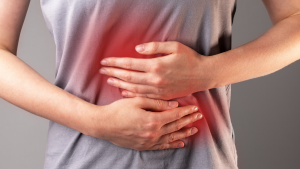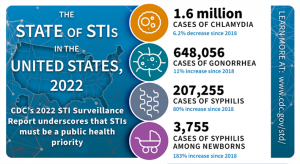Doxy-PEP is a new strategy for preventing sexually transmitted diseases
/*! elementor – v3.19.0 – 28-02-2024 */ .elementor-widget-image{text-align:center}.elementor-widget-image a{display:inline-block}.elementor-widget-image a img[src$=”.svg”]{width:48px}.elementor-widget-image img{vertical-align:middle;display:inline-block}
Doxy-PEP—or doxycycline post-exposure prophylaxis—is a sexual health strategy that involves taking an antibiotic by mouth after sex without condoms to prevent chlamydia, gonorrhea, and syphilis.
This strategy comes at a time when bacterial STDs are on the rise. Recently released data from the CDC showed that 2.5 million cases of chlamydia, gonorrhea, and syphilis will be reported in the United States in 2022. Cases of chlamydia and gonorrhea—the two most commonly reported STIs—have remained high for many years, and syphilis cases have recently skyrocketed. . The number of primary and secondary syphilis infections in 2022 was 80% higher than in 2018.
Doxy-PEP is the first new prevention method for bacterial STDs, and many experts believe it will be an important tool in our fight against this epidemic. The CDC is still working out its official guidelines for Doxy-PEP, but this is what we know so far.
What is Doxy-PEP?
Doxy-PEP is the strategy of taking the antibiotic doxycycline after oral or anal sex without a condom to prevent chlamydia, gonorrhea, or syphilis.
Who can/should use Doxy-PEP?
Doxy-PEP is for adult men who have sex with men and transgender women who have sex with men, especially those who have had a sexually transmitted disease in the last year. Health care providers can also recommend it to people in this community who have more than one partner.
What about cisgender men who have sex with women and should cisgender women use Doxy-PEP?
Some providers may offer Doxy-PEP to cisgender men who have sex with women if they have had unprotected sex with more than one partner, especially if they have had a bacterial STD such as syphilis in the past year. Research with this group is still ongoing.
So far, research has not found Doxy-PEP to be effective in preventing sexually transmitted diseases in same-sex women who have sex with their penis in the vagina. More research is being done in this and other populations such as teenagers.
How do I take Doxy-PEP?
You need a prescription for Doxy-PEP. You can talk to your health care provider or go to a sexual health clinic like the ones they offer STD screening. Because you need to take Doxy-PEP quickly after sex without a condom, it’s a good idea to talk to your healthcare provider about it before you need it.
How do I use Doxy-PEP?
People using Doxy-PEP take 200 mg of doxycycline (usually two 100 mg pills) within 72 hours of unprotected sex, although sooner is better. Doxy-PEP can be used whenever you have sex without condoms, but you should not take more than 200 mg of doxycycline in a 24-hour period.
How much does Doxy-PEP cost?
Doxycycline is usually inexpensive and usually covered by insurance. Some places may offer Doxy-PEP for free.
How well does Doxy-PEP work?
There is still a lot of research to be done on this new strategy, but early studies show that it can reduce the risk of syphilis and chlamydia by 80% or more and reduce the risk of gonorrhea by 50%.
Does Doxy-PEP have side effects?
Doxycycline is a common antibiotic that many of us have taken for other infections. Like other antibiotics, it can upset your stomach. Take it with plenty of water and try not to lie down for half an hour. Doxycycline can also make you more sensitive to the sun, so you should try to avoid prolonged exposure while taking it.
Some people may have more severe reactions. Talk to a health care provider if you have other symptoms — such as a bad headache or blurred vision — after taking it.
Isn’t it bad to take antibiotics when you’re not sick because of antibiotic resistance?
Over the years we’ve been told that overuse of antibiotics is a problem because it can lead to antibiotic-resistant bacteria (infections that don’t respond to the drugs we have to treat them). Research done so far has not found that Doxy-PEP increases drug resistance in patients, but scientists should continue to monitor it.
Gonorrhea is one of the bacteria that has become resistant to certain antibiotics. In fact, about 25% of gonorrhea strains are resistant to doxycycline. This may be why Doxy-PEP does not work as well against gonorrhea as it does against chlamydia and syphilis.
Does Doxy-PEP protect against MPox or HIV?
Doxy-PEP only protects against bacterial STDs. It does not protect against viruses such as MPox, HIV or herpes. The best protection against Mpox is the vaccine. If you think you are at risk for HIV, talk to your healthcare provider about post-exposure prophylaxis (PEP) and pre-exposure prophylaxis (PREP).
Should I continue to get regular STD tests even if I use Doxy-PEP?
Yes. It’s important to keep up with STD tests and get checked if you have symptoms. The CDC recommends that MSM be tested for chlamydia, gonorrhea, and syphilis at least annually and more frequently (every 3 to 6 months) if you are at increased risk due to HIV infection or multiple partners. Talk to your healthcare provider about how often you should be checked.
More to explore

Diagnosis and Management of Genital Herpes: A Two-Way Conversation with Terri Warren, RN, ANP
Genital Herpes Diagnosis and Management A Two-Part Conversation with Terri Warren, RN, ANP In this two-part episode of ASHA’s Sex+Health podcast, Terri Warren, RN, ANP—nurse, author, and owner of Westover Heights Clinic in Portland, Oregon that specializes in genital herpes infection—explains the tests that

Doxy-PEP is a new strategy for preventing sexually transmitted diseases
Doxy-PEP is the strategy of taking the antibiotic doxycycline after oral or anal sex without a condom to prevent chlamydia, gonorrhea, or syphilis.

New studies add to evidence that Doxy-PEP works to prevent sexually transmitted infections
New studies add to our evidence that Doxy-PEP works to prevent bacterial STDs among transgender women and men who have sex with men.

PID is the leading cause of infertility in women
Pelvic inflammatory disease (PID) Pelvic inflammatory disease (PID) is a serious infection of the upper genital tract/reproductive organs (uterus, fallopian tubes, and ovaries) in women. PID can be sexually transmitted or occur naturally. It can lead to infertility in women (they cannot have children) or

Even more evidence for the value of early HPV vaccination
More evidence for the value of early HPV vaccination An exciting new study in Scotland found no cases of invasive cervical cancer in young women who had the HPV vaccine by age 14. The study also found that women were vaccinated

The State of Sexually Transmitted Diseases — The CDC reports an alarming increase in syphilis
The CDC has released new surveillance data on sexually transmitted infections. There were 2.5 million cases of chlamydia, gonorrhea, and syphilis reported in the United States in 2022. Gonorrhea and chlamydia rates remain high, and syphilis rates have increased an alarming 80% since 2018.
The post Doxy-PEP is a new strategy for STD prevention appeared first on American Sexual Health Association.
